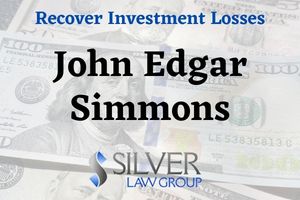FINRA Bars John Edgar Simmons, Jr. After Allegations Of Engaging In A Private Securities Transaction
 John Edgar Simmons, Jr. (CRD: #4878890) is a former registered broker and insurance advisor whose last known employer was LPL Financial LLC (CRD#:6413) of Gulf Breeze, FL. He was previously employed with Investors Capital Corp. (CRD#:30613) of Pensacola, FL, LPL Financial in McMinnville, TN, and Edward Jones (CRD#:250), also of McMinnville. He has been in the industry since 2005.
John Edgar Simmons, Jr. (CRD: #4878890) is a former registered broker and insurance advisor whose last known employer was LPL Financial LLC (CRD#:6413) of Gulf Breeze, FL. He was previously employed with Investors Capital Corp. (CRD#:30613) of Pensacola, FL, LPL Financial in McMinnville, TN, and Edward Jones (CRD#:250), also of McMinnville. He has been in the industry since 2005.
LPL terminated Simmons employment and filed a Form U5 with FINRA on 9/17/2020 indicating his discharge from the firm. The stated reason for his discharge was the result of an internal review investigating Simmons involvement in a private securities transaction. He neither notified the firm nor sought permission.
During the course of FINRA’s investigation, staff sent Simmons a letter requesting he supply information and documentation related to the allegations in the Form U5. FINRA staff sent the letter on 02/24/2021. Simmons’ attorney responded by letter on 3/9/2021, acknowledging receipt of the FINRA request and indicating that he would not provide any information now or in the future. His denial violates FINRA Rules 8210 and 2010, and led to a letter of Acceptance, Waiver & Consent (AWC). The letter includes a bar on any involvement with a FINRA member in any capacity.
Simmons was also the subject of a customer dispute filed on 10/26/2012. The customer filed allegations that Simmons “made unsuitable recommendations and misrepresentations in connection with variable annuity and REIT [Real Estate Investment Trusts] investments. activity period 6/08 to 7/09.” This claim was settled for $28,000. No additional information is available.
The third disclosure in Simmons’ record is a bankruptcy discharge filed on 6/20/2018, with no additional information disclosed.
Private Securities Transactions
In many of our blogs, we highlight brokers who are sanctioned, suspended and barred for various types of infractions. One of those is the practice of engaging in private securities transactions, or those outside of the realm of their employment with their FINRA member firm.
FINRA’s Rule 3280 describes in detail the required conditions that a broker must comply with in order to handle a private securities transaction. They include:
- Notifying the employer firm of intent to engage in a private securities transaction
- Notice must be in writing and prior to the transaction
- Whether compensation is expected, and how much
There are some limited exceptions, such as handling a transaction for a family member. Personal transactions in an investment company and those for variable annuities may also be excluded. However, even a personal transaction may be considered “private.”
A broker who sells securities that are not registered with the SEC or are not offered by his or her firm is also called “selling away.” One of the reasons for this rule is to avoid any conflicts of interest. However, private transactions may also be part of other illegal activities, such as a Ponzi scheme.
Did You Invest With John Edgar Simmons?
Silver Law Group represents investors in securities and investment fraud cases. Our lawyers are admitted to practice in New York and Florida and represent investors nationwide to help recover investment losses due to stockbroker misconduct. If you have any questions about how your account has been handled, call to speak with an experienced securities attorney. Most cases are handled on a contingent fee basis, meaning that you won’t owe us until we recover your money for you. Contact us today at (800) 975-4345 and let us know how we can help.
 Securities Arbitration Lawyers Blog
Securities Arbitration Lawyers Blog

